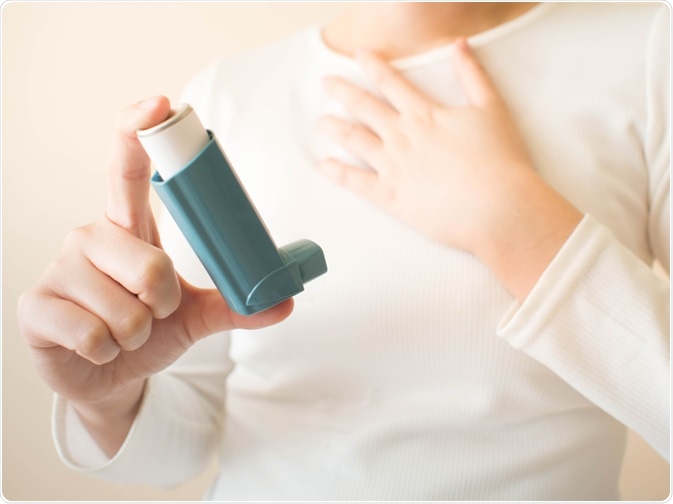Potential asthma-COVID-19 risk
People with asthma develop infections of the lower respiratory tract (LRT) more frequently than those without, and episodes of LRT infection in asthmatic patients are longer and more severe. In people with poorly controlled asthma, viral infections of the respiratory system cause more acute symptoms than people with well-controlled asthma.

Asthma. Image Credit: Orawan Pattarawimonchai/Shutterstock.com
Furthermore, rhinovirus infections can induce asthma exacerbation. The mechanism for this appears to be delayed and deficient antiviral immune responses in people with asthma, specifically a delayed and inadequate interferon response. Interferons are antiviral cytokines that prevent viral replication in infected cells and promote antibody production.
Given the relationship between asthma, immune functioning, and clinical severity in respiratory infection, it would appear somewhat inevitable that asthma should be identified as a risk factor for severe outcomes in COVID‐19.
Asthma prevalence in COVID-19 patients
Initial case studies published early in the pandemic did not appear to implicate asthma as a risk factor. One of the first reports from Wuhan described the clinical characteristics of 140 cases of COVID-19, including 58 cases deemed as severe. Of this cohort, there were no self-reported diagnoses of asthma among patients. A similar study assessed the clinical features of 290 laboratory-confirmed cases of COVID-19, of which only one patient was asthmatic.
As case series analyses progressed, asthma continued to present no additional risk factor for severe outcomes for COVID-19. However, in such studies, the chronic respiratory disease had the third highest fatality rate after diabetes and cardiovascular disease. In such studies, people with asthma may have among the respiratory disease group, but not identified specifically as being asthmatic.
Analysis of a large cohort of patients in the US who were hospitalized with COVID-19 did demonstrate a high prevalence of asthma (14%). However, once other known risk factors for COVID-19 were controlled for, including age, sex, and comorbid diseases, no significant association between asthma and however, when adjusting for sex, age, and comorbidities, no association between asthma and risk of hospitalization with COVID-19 was found.
A later analysis conducted by the US Center for Disease Control (CDC) recorded a 17% prevalence of asthma among hospitalized patients, but again, did not control for other disease factors. For example, rates of sleep apnoea, obesity, and high blood pressure were higher amongst the hospitalized asthmatic patients, suggesting that it is these conditions that may contribute towards risk for COVID-19 rather than asthma per se.
Risk of morbidity and mortality
Studies to date have not convincingly demonstrated that asthma increases susceptibility to becoming infected with COVID-19. In previous and similar pandemics, such as the H1N1 avian influenza outbreak, patients with asthma who were hospitalized with the virus had a less complicated clinical course in hospital: they were less likely to require ventilation and less likely to die.
Two US-based studies that compared clinical outcomes for people hospitalized with COVID-19 have shown no difference in mortality rates between patients with and without asthma.
Data from the United Kingdom, which has drawn on mass electronic health record screening and biobank data, has shown that the relationship between asthma and COVID-19 may be more complex. In these studies, the risk of death from COVID-19 was higher for asthmatic patients who had documental use of oral corticosteroids in the previous 12 months, an indicator of asthmatic severity. This study also considered relationships between different phenotypes of asthma and COVID-19 infection.
Interestingly, the risk was mostly related to non-allergic asthma. Non-allergic asthma, interestingly, may have a protective factor against the SARS-CoV-2 virus. This phenotype of asthma is characterized by inflammation of eosinophils, blood cells that form part of the immune system.
Advice for asthma management
Patients with asthma should aim to keep their asthma under control by continuing to follow their personalized asthma action plan. This includes monitoring symptoms, continuing with prescribed medication, and using their peak flow meter regularly. Patients should avoid their asthma triggers and ensure they have an emergency supply of prescribed medication in case of needing to self-isolate.
Given the lack of strong consensus surrounding the interplay between asthma and COVID-19, the CDC has not made changes to their asthma management guidelines. Exacerbations should continue to be treated with corticosteroids as there is no evidence that corticosteroids increase COVID-19 severity. It is abundantly clear, however, that corticosteroids are highly effective in treating asthma exacerbations.
If clinicians are concerned that an asthma exacerbation is due to an undiagnosed COVID-19 infection, then routine testing procedures should be followed.
If asthmatic patients with COVID-19 symptoms or infection require nebulization, then healthcare staff should follow aerosol-generating safety procedures, including the use of high-level personal protective equipment and thorough disinfection of clinical areas. Patients with a COVID-19 diagnosis or symptoms who nebulize in the home should use them in locations separate to other household members, preferable outside.
References
- Assaf, S. M. , Tarasevych, S. P. , Diamant, Z. & Hanania, N. A. (2021). Asthma and severe acute respiratory syndrome coronavirus 2019. Current Opinion in Pulmonary Medicine, 27(1), 45–53. doi: 10.1097/MCP.0000000000000744.
- Healthcare Workers. (2021). Retrieved 16 April 2021, from https://www.cdc.gov/coronavirus/2019-ncov/hcp/faq.html#Patients-with-Asthma
- Jackson, D. J., Trujillo-Torralbo, M. B., del-Rosario, J., Bartlett, N. W., Edwards, M. R., Mallia, P., Walton, R. P., & Johnston, S. L. (2015). The influence of asthma control on the severity of virus-induced asthma exacerbations. The Journal of allergy and clinical immunology, 136(2), 497–500.e3. https://doi.org/10.1016/j.jaci.2015.01.028
- Johnston S. L. (2020). Asthma and COVID-19: Is asthma a risk factor for severe outcomes?. Allergy, 75(7), 1543–1545. https://doi.org/10.1111/all.14348
- Makris, S., Paulsen, M., & Johansson, C. (2017). Type I Interferons as Regulators of Lung Inflammation. Frontiers in immunology, 8, 259. https://doi.org/10.3389/fimmu.2017.00259
Further Reading
Last Updated: Jan 17, 2022